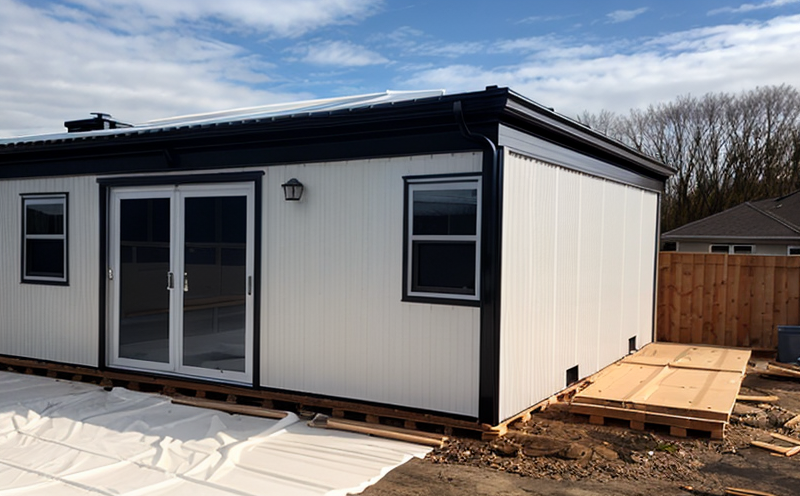ISO 14683-1 Thermal Insulation Performance for Walls
The ISO 14683-1 standard is pivotal in the building and infrastructure testing sector, particularly when it comes to assessing thermal insulation performance. This test specifically focuses on the thermal resistance of wall constructions, which is crucial for ensuring energy efficiency, occupant comfort, and compliance with regulatory standards.
Thermal insulation plays a significant role in minimizing heat loss during winter and reducing excessive heat gain during summer. Achieving optimal thermal performance requires precise measurement and evaluation techniques that are both accurate and reliable. The ISO 14683-1 standard provides a robust framework for these evaluations, ensuring consistency across different testing facilities.
The test involves measuring the steady-state thermal resistance of wall constructions under controlled conditions. This includes setting up a specimen that represents typical construction practices, applying standardized heating or cooling, and monitoring temperature differences to calculate R-values. These values are then used to assess the effectiveness of the insulation in reducing heat flow through walls.
Understanding the implications of this test is essential for quality managers, compliance officers, and R&D engineers involved in building design and construction. By ensuring that the thermal performance meets or exceeds specified standards, these professionals can contribute to sustainable buildings that are both energy-efficient and comfortable.
The significance of ISO 14683-1 extends beyond just meeting regulatory requirements; it also supports broader sustainability goals. In the context of climate change mitigation, enhancing thermal insulation is a key strategy. Buildings account for a significant portion of global greenhouse gas emissions, particularly in heating and cooling processes. By optimizing insulation performance, we can reduce energy consumption and lower carbon footprints.
Furthermore, this test helps developers and architects make informed decisions about materials and designs that contribute to better indoor air quality and occupant health. The data generated from ISO 14683-1 testing provides insights into how different insulating materials perform under various climatic conditions, thereby aiding in selecting the most appropriate options for specific projects.
With increasing focus on sustainable practices and green building certifications, the importance of accurate thermal insulation performance testing cannot be overstated. This not only ensures compliance with local regulations but also positions buildings as leaders in environmental responsibility.
Applied Standards
The ISO 14683-1 standard is widely recognized for its comprehensive approach to evaluating thermal insulation performance. This international standard is applicable to a variety of wall constructions, including those made from traditional materials like brick and concrete as well as more modern composite systems.
- Scope: The standard covers the measurement of steady-state thermal resistance of walls under controlled conditions.
- Apparatus: Specific apparatus is required to conduct these tests, including calorimeters, temperature sensors, and insulation specimens. These instruments must meet stringent accuracy requirements set forth by ISO standards.
- Acceptance Criteria: The test results are evaluated based on predefined acceptance criteria which ensure the reliability of the measurements. Compliance with these criteria is critical for valid testing outcomes.
The application of this standard ensures that all tests conducted adhere to uniform procedures, thereby enhancing confidence in the data produced. This consistency is particularly important given the global nature of construction projects where compliance with local standards may vary.
For those involved in building and infrastructure testing, familiarity with ISO 14683-1 is essential for accurate and compliant testing practices. Compliance with this standard also facilitates smoother interactions between stakeholders including architects, builders, and regulatory bodies.
Eurolab Advantages
At Eurolab, we pride ourselves on providing unparalleled expertise in building and infrastructure testing services. Our comprehensive understanding of ISO 14683-1 ensures that our clients receive accurate and reliable results every time.
- State-of-the-Art Facilities: Equipped with advanced equipment and technology that meets the highest international standards, Eurolab guarantees precise measurements and consistent test conditions.
- Experienced Professionals: Our team comprises highly skilled professionals who are trained in conducting ISO 14683-1 tests according to the latest methodologies. They bring deep industry knowledge which enhances the accuracy of our findings.
- Dedicated Reporting: Eurolab offers detailed and comprehensive reports that not only present test results but also interpret them within broader contexts, providing valuable insights for decision-makers.
- Compliance Assurance: By adhering strictly to ISO 14683-1 guidelines, Eurolab ensures full compliance with all relevant regulations, reducing the risk of non-compliance penalties.
Our commitment to excellence extends beyond just delivering accurate results; we also prioritize client satisfaction by offering timely and personalized services tailored to individual needs. Whether you're a quality manager looking for precise testing or an R&D engineer seeking cutting-edge research support, Eurolab is your partner in achieving top-notch building performance.
Why Choose This Test
- Comprehensive Evaluation: ISO 14683-1 provides a thorough assessment of thermal insulation, ensuring that all aspects are considered for optimal performance.
- International Recognition: Being an international standard, it guarantees consistency and reliability in test results across different regions and countries.
- Regulatory Compliance: Ensures that building projects meet stringent regulatory requirements, thereby reducing legal risks.
- Sustainability Focus: Helps in creating environmentally friendly buildings by focusing on energy efficiency and reduced carbon footprints.
The ISO 14683-1 test is chosen for its ability to provide robust data that supports informed decisions. It enables stakeholders to understand the true thermal performance of wall constructions, which is vital for sustainable design practices. By choosing this test, you ensure that your projects are not only compliant but also ahead of industry standards.
The precision and reliability offered by ISO 14683-1 make it an indispensable tool in the building and infrastructure sector. It allows professionals to assess insulation performance accurately, making informed decisions about material choices and construction techniques. This leads to energy-efficient buildings that contribute positively to environmental sustainability while enhancing occupant comfort.





